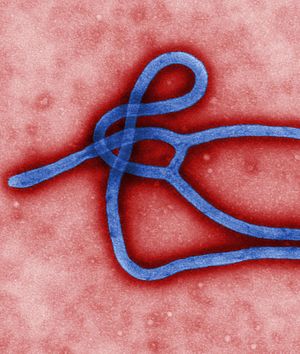China stepped up its assistance to Sierra Leone on Tuesday when it sent a 59-member laboratory team to the West African nation to help contain the growing Ebola virus epidemic. The decision to dispatch Chinese human resources to Africa will ostensibly help bolster China’s reputation as an active participant in the global fight against Ebola and help China combat perceptions of disinterested mercantilism in Africa. China has come under some criticism globally for devoting just 0.4 percent of its foreign aid to humanitarian causes. With its response to this year’s Ebola outbreak in West Africa, Beijing is looking to shift perceptions both on the African continent and globally.
According to Xinhua, the team that left for Sierra Leone on Tuesday is from the Chinese Center for Disease Control and Prevention and will be conducting its work at the Sierra Leone-China Friendship Hospital in the outskirts of Freetown, the country’s capital. The Chinese team is expected to “carry out lab screening and observation to help Sierra Leone to improve lab testing.” The 59-member team adds to the 115 medical experts China has already sent to Guinea, Liberia, and Sierra Leone. This group is the first Chinese humanitarian team to bring laboratory resources to the frontlines in the fight against Ebola.
In early August, the Chinese government shipped $5 million in medical supplies to Guinea, Liberia, and Sierra Leone, including “personal protective gears, gloves and glasses as well as chlorine and other medicines to help fight the disease.” Back then, it promised that it would begin sending expert teams to these countries as well. Additionally, as Agence France-Presse reported in August, several Chinese medical workers were found to have contracted the virus during their work in Sierra Leone.
To be sure, China’s generous response to the crisis is ostensibly positioned to protect Beijing’s significant economic stakes in the continued health and prosperity of these West African nations’ economies, as well as protecting Chinese citizens living and working in these areas. For example, the China International Water and Electric Corporation, a state-owned subsidiary of the China Three Gorges Corporation, is currently building a $446 million hydroelectric power plant in Guinea. Furthermore, Quartz reports that Huawei, a private Chinese technology firm, also has significant operations in Guinea. Meanwhile, Chinese investors have publicly stated their anxiety over the Ebola epidemic, indicating that the outbreak “has cast a shadow over new possible investment from China.”
As analysts call for China to play a greater role in global public goods provision, it makes sense for Beijing to start by channeling more resources into visible public health issues like the Ebola epidemic. Given the massive discrepancy between China’s status as the world’s second largest economy but only its 29th most generous humanitarian donor (just under Greece and just above Portugal), Beijing’s continued involvement in the fight to contain Ebola can only reap positive reputational dividends. This is particularly important in Africa, where Beijing is keen to fight the perception that it is solely interested in economic dividends without investing in the figurative and literal health of the continent. Although significant amounts of Chinese foreign aid funding goes into infrastructure projects that certainly increase the quality-of-life and welfare for the residents of African countries, Beijing’s perceived reluctance to fund humanitarian causes on the continent has left it facing much criticism.
So far, China’s reaction to the Ebola epidemic has been encouraging and signals Beijing’s interest in being perceived as a responsible stakeholder in Africa. Beijing’s swift and generous reaction to West Africa’s Ebola crisis should be contrasted with what was perhaps the nadir in Chinese humanitarian policy: its reluctant reaction to the Philippines’ suffering during Typhoon Haiyan when it first donated just $100,000 to much international criticism. Today, China measures up as a great power on several important metrics of state power. By becoming an active participant in the global public goods provision and a proactive contributor to solving humanitarian crises, Beijing can act the part as well.

































